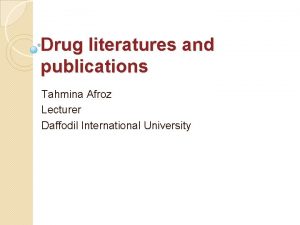Swiss Fight Against Malnutrition Impact of an Official

- Slides: 1

Swiss Fight Against Malnutrition – Impact of an Official Z. Stanga, R. Meier, C. Pichard and the Executive Committee of the Swiss Society of Clinical Nutrition ( SSCN ) Curriculum University Hospital, CH-3010 Bern, tel. +41316324246, e-mail: zeno. stanga@insel. ch Switzerland demographics: 7‘ 508‘ 700 inhabitants, 572 hospitals, 5 university hospitals Rationale 40% of hospitalized patients are malnourished. Malnutrition leads to increased morbidity, longer hospital stays, decreased quality of life and higher costs. Nutritional intervention is cost-effective. The level of knowledge and the awareness of nutritional problems are low among caregivers. The SSCN established a system and created policies to prevent malnutrition. The implementation of policies to promote nutrition has to be accompanied by a training programme for caregivers. Methods Structural map of the CASCN The SSCN has launched its educational programme in clinical nutrition in affiliation with 5 Swiss Faculties of Medicine. The Certificate of Advanced Studies in Clinical Nutrition Directory and Medical Faculty of the Swiss Universities Executive Committee of the SSCN (CASCN) has been established in 2007. Objectives of the CASCN: • to establish/improve education, information, competence and skills standards for health professionals • to create an official organisation to certify specialists belonging to a competent national network in clinical nutrition Course Directors Ms. Prof. MM. Berger (SSCN, Chairman of the Scientific Committee CASCN Prof. C. Pichard (SSNC, Chairman of the Educational Committee CASCN) Prof. E. Sterchi and Prof. P. Diem (Faculty of Medicine, University of Bern) Scientific Committee Chairman: Ms. Prof. MM. Berger + 5 members (SSCN) Educational Committee Chairman: Prof. M. Roulet + 5 members (SSCN) A tight co-operation with the ESPEN Life-Long-Learning (LLL) programme and a close collaboration with other national societies (D, A, F, I) exist already. Structure Executive Board Dr. Z. Stanga (SSCN, Medical Faculty of the University of Bern) Dr. R. Imoberdorf (SSCN) The modular programme has been designed for full-time Coordination CASCN Ms. P. Imoberdorf employees, consisting in 15 ECTS (European Credit Transfer System). A case report discussion and an active participation at Applicants CASCN Physicians, pharmacists, dieticians, nurses, nutritionists, biologists and professionals with interest in clinical nutrition an international congress are included. The certificate will be given after an oral presentation at the National SSCN congress. The CASCN can be completed within 3 years. Impact on Clinical Nutrition in Switzerland (2007 -2009) • course evaluation (total participant course hours: 11’ 500) • introduction of nutrition in the official curriculum of the Swiss Medical Faculties • creation of 9 new Nutrition Support Teams • formation of 3 new Units for Clinical Nutrition • increasing SSCN-membership (237 250); 170 ESPEN block members Conclusions The CASCN raises the awareness of many healthcare stakeholders offers a structured and official training for medical and non-medical staff promotes good practice and quality assurance control Submission date: th 28 of May 2009 Course Advisors Swiss experts in Clinical Nutrition Organisators of SSCN-courses Organisators of courses with SSCN-patronage SSCN-Courses: National distribution Languages: French German Italian

